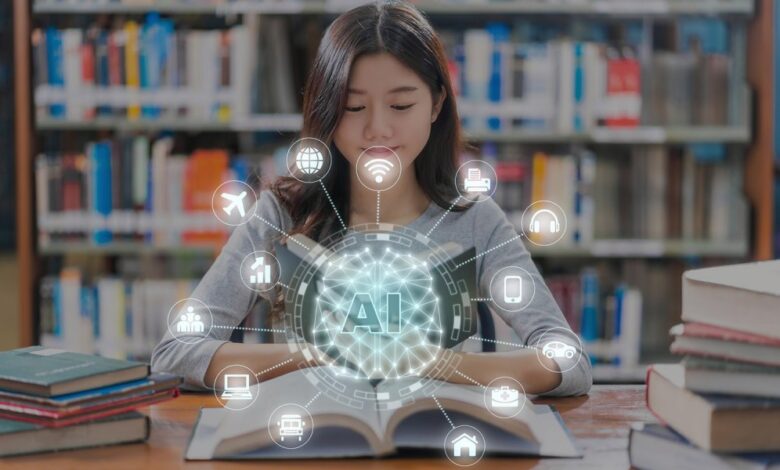AI-Powered Study Tools for Science Majors

Today’s science majors are under the most pressure to get into the academy of payback more than ever before, despite tuition rates that are continually increasing and student loan debt marked by a record high. To secure competitive jobs after graduation, they need to learn complex scientific concepts and pass the exams. Fortunately, a new onslaught of AI-driven study tools is here to take the place of those old ways to learn for science students that save time and remove stress.
This article is about the latest AI innovations that will reinvent studying for science majors over the next few years. Science students can learn in a fraction of the time, without burning out, in the short time that they have, using intelligent tools.
The Problem With Traditional Studying
Most science majors rely on conventional study tactics like rereading textbook chapters, transcribing notes, and cramming information the night before an exam. Unfortunately, these passive methods have serious drawbacks:
- They’re time-intensive yet ineffective for long-term retention.
- There’s no feedback on progress or areas for improvement.
- Information is presented in a one-size-fits-all way.
Additionally, the sheer volume of material in science degrees makes studying ineffective, an even bigger pitfall. For example, biology majors must memorize upwards of 6,000 new vocabulary words in just 4 years.
Rote memorization and a linear learning path cause many students to become overwhelmed, stressed, and ultimately disengaged. They’re forced to choose between barely keeping up and burning themselves out.
But with AI-powered tools, like Biology AI Solver, on the rise, science majors no longer have to rely on passive, inefficient studying to tackle complex concepts, equations, models, nomenclatures, and theories. The latest platforms enable smarter, personalized, and more efficient learning optimized for scientific topics.
The Promise of Adaptive Learning Platforms
Adaptive learning represents a major shift in educational technology. These platforms use advanced algorithms to provide customized experiences for each student without human intervention. They make studying more efficient by:
- Offering personalized content based on individual strengths, weaknesses, and pace.
- Providing targeted feedback and recommendations to improve weak areas.
- Continuously optimizing sequencing and instructional strategies to enhance engagement and comprehension.
For science students, adaptive courseware has incredible potential to zero in on precise knowledge gaps within complicated domains. Rather than march through a pre-arranged syllabus, the platform gauges mastery in real-time and serves up appropriate content accordingly.
For example, imagine two organic chemistry students reviewing SN1 reactions. Student A understands the concepts but struggles with predicting products. The platform would feed Student A more product prediction problems. Student B grasps reactions but not the concepts, so they receive more concept-based content.
Such differentiated instruction was previously impossible on a large scale, but adaptive tech makes it a reality. Early research shows these platforms can reduce study time while improving grades and retention over 15 weeks by nearly 50% compared to static content.
As the technology matures, expect adaptive courseware to become a staple study tool, especially for undergraduates tackling complex, cumulative science topics. Intelligent algorithms personalize the learning experience so students spend less time confused and more time progressing.
AI Tutors That Teach to Each Student’s Needs
While adaptive platforms focus on content sequencing, AI tutors specialize in natural language conversations. These intelligent chatbots act as personalized tutors inside messaging apps or education apps. They not only answer questions but also explain concepts, identify knowledge gaps, suggest helpful resources, and motivate students.
AI tutors leverage machine learning algorithms to hold productive tutoring sessions at scale. The more students interact with a system, the better it adapts to their needs over time. Sessions feel natural because today’s NLP models handle nuanced dialogues with ease.
For example, Chip is an AI tutor created specifically for computer science and coding. Students can text Chip questions on anything from HTML syntax to Python data structures. The bot provides clear explanations, code examples, and follow-up questions to ensure comprehension, just like a human tutor. Another example, Smodin has several AI solvers, such as biology, physics, or math AI solvers. You can ask your questions, exercises, or tasks, and the tool will give you an answer with a full explanation.
As AI tutor technology improves, expect science students to have on-demand access to intelligent assistants. These bots could handle administrative tasks like scheduling, connect students to peer study groups, and most importantly, tutor individuals based on their evolving needs.
Such innovations will make quality, personalized tutoring affordable and accessible for every science major, leading to better academic outcomes.
AI Writing Assistants for Scientific Writing
Writing persuasively constitutes an essential but difficult skill for science students. They must compose lab reports, literature reviews, research projects, and other scientific writing to showcase their critical thinking. Yet, clear, evidence-based writing doesn’t come naturally to most.
Thankfully, AI writing assistants are gaining steam as editing and feedback tools for science students. These apps apply NLP algorithms to analyze writing quality at the structural, sentence, and word levels. Students submit a draft, then receive targeted, actionable feedback to strengthen their work.
For example, sites like WriteLab provide personalized recommendations on clarity, concision, flow, grammar, and more. Users can even ask questions about suggested edits to improve their skills. Other tools like Revision Assistant and Turnitin offer similar capabilities, plus plagiarism checking.
As this technology advances, expect even smarter scientific writing assistants. Future AI apps could…
- Scan for logical fallacies, credibility issues, and biases.
- Check disciplinary writing conventions like APA or CSE formats.
- Provide vocabulary and readability metrics to match audience needs.
- Suggest evidence from journals and databases to support claims.
- Summarize critical arguments to emphasize key points.
Such support will help science students perfect the academic writing craft faster. With an AI assistant analyzing their work, they can focus less on mechanics and more on developing ideas and critical thinking abilities that drive science forward.
Automated Assessment to Cut Grading Timelines
For science professors facing large classes, grading written work is a bear. Carefully evaluating problem sets, essays, code, and other assignments takes significant time. But AI-based assessment tools promise to slash grading timelines through automation.
AI grading leverages NLP and machine learning to evaluate student work algorithmically. The professor trains the model by inputting exemplary responses. As the system grades more submissions against the training set, its evaluation abilities improve.
SciPro is one emerging platform using this approach to assess short answers and mathematical problems. Another tool called Gradescope automatically grades handwritten work, including diagrams. So far, studies show these tools can replicate human grading with over 90% accuracy.
By instantly providing scores and feedback around common issues, AI assessment systems allow professors to focus their limited time on in-depth coaching rather than routine grading. They also enable new teaching methods like just-in-time interventions and mastery-based progression.
As adoption grows, expect AI to become a standard grader for large science courses. Intelligent models will handle the bulk of routine assessments, analyze performance trends across student groups, and free up faculty to have deeper instructional interactions.
The Bottom Line
As it is today, science students don’t have to remain locked up in the library for so long or memorize endless flashcards to keep up. AI-powered, most recent adaptive platforms in the latest generation provide smarter ways of mastering difficult concepts as fast and thoroughly as possible.
These tools optimize studying for science topics by using personal content sequences, conversational tutoring, writing feedback, and automated assessment. Students can gather data-driven insights to strengthen areas they lack, while the professors can teach them more efficiently.
However, while these technologies represent something of an evolution at this point, at least the future of learning for science majors is likely to be characterized by intelligence, automation, and analytics. Because of it, students worldwide will become more proficient scientists and critical thinkers.





